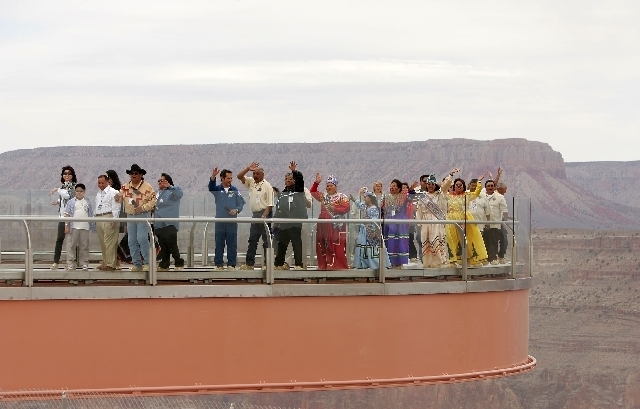Courts upholds $28.5 million award in Skywalk case

FLAGSTAFF, Ariz. — A federal court has dealt a blow to the business arm of a northern Arizona tribe that owns the Grand Canyon Skywalk by upholding a $28.5 million judgment in favor of a Las Vegas developer who invested the money to build the horseshoe-shaped glass bridge on tribal land.
The ruling Monday by U.S. District Judge David Campbell rejected arguments by the Hualapai Tribe that the award isn’t enforceable, at times calling the arguments “nonsensical” and “odd.” The American Arbitration Association had determined David Jin is owed the money, mostly for management fees that he was to receive under a 2003 contract with the tribe.
Mark Tratos, an attorney for Jin, said Monday that the ruling shows U.S. citizens have recourse in contract disputes with American Indian tribes.
“Their idea is, ‘We can do what we want to anyone we want, anytime we want because we’re a sovereign,’ ” Tratos said.
The judgment applies to the Hualapai Tribe’s business arm, Sa’ Nyu Wa Inc., which had argued the arbitration association lacked jurisdiction and declined to participate in the final arbitration hearing. The tribe said proceeding with arbitration was unnecessary because it had already enforced eminent domain over the contract, taking sole control of the Skywalk.
Campbell said Sa’ Nyu Wa could not take away the right of Jin’s company to arbitrate its claims, and that the corporation failed to identify what public good would be served by doing so.
A spokesman for the tribe, Dave Cieslak, said Sa’ Nyu Wa is reviewing its options.
The Skywalk has been a popular tourist attraction for the Hualapai Tribe, giving some 300,000 visitors a year a view of the Colorado River 4,000 feet below. Jin invested $30 million to build the bridge that lies just west of Grand Canyon National Park, but he and the tribe have disagreed on management fees and an incomplete visitors’ center.
The arbitrator found Sa’ Nyu Wa and the tribe failed to keep adequate financial records or make those records available for Jin’s company to audit. The arbitrator also found the corporation and tribe failed to pay management fees and the Skywalk operation’s business expenses, which constituted a breach of contract.
The tribe has said it took over the contract last year because Jin never completed a visitors center that people must pass through to access the Skywalk and did not finance the utilities.
Cieslak said the tribe would pay Jin the fair market value for the Skywalk to “protect the rights of the tribe and end this painful dispute.”
Sa’ Nyu Wa had asked Campbell to reject the arbitration award by arguing that the tribe’s 2003 agreement with Jin didn’t allow for financial damages.
Campbell found that Sa’ Nyu Wa clearly waived it sovereign immunity with respect to financial damages awarded in arbitration that could be enforced in federal court.












